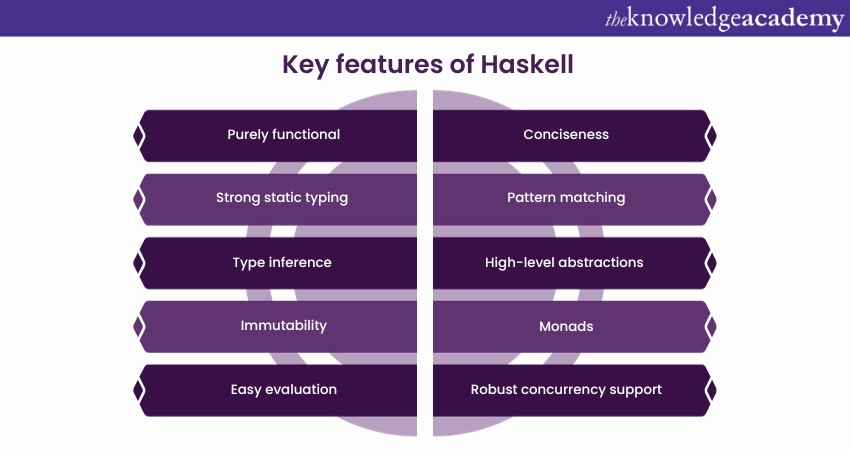We may not have the course you’re looking for. If you enquire or give us a call on 01344203999 and speak to our training experts, we may still be able to help with your training requirements.
We ensure quality, budget-alignment, and timely delivery by our expert instructors.

Whether you are a seasoned programmer or new to the field, understanding Haskell offers a fresh perspective on solving complex computational problems. But What is Haskell? It is a unique and powerful programming language that stands out in software development for its distinctive approach to coding. As a purely functional language, Haskell departs from the imperative programming style found in languages like C++ or Python.
It emphasises functions and their interactions, mirroring mathematical logic and theory. Renowned for its static solid typing and lazy evaluation, it ensures that computations are performed only when necessary, leading to efficient and error-resistant code. In this blog, you will learn about What is Haskell, why should it be used, key features and some drawbacks to help you decide why you need to use it.
Table of Contents
1) What is Haskell Programming Language?
2) Why should you use Haskell?
3) How to run Haskell code?
4) Key features of Haskell
5) Drawbacks of Haskell
6) Conclusion
What is Haskell Programming Language?
Haskell is a purely functional programming language known for its strong emphasis on type safety, mathematical accuracy, and easy evaluation. Unlike imperative languages, Haskell treats computation as evaluating mathematical functions, significantly aiding in producing bug-free, maintainable, and concise code.
It features an inference system, allowing for more flexible and general code without the verbosity of explicit type declarations. Haskell's lazy evaluation means that code is executed only when needed, optimising performance. It is widely used in academia and applied in industry sectors for tasks requiring reliable, high-performance computing, like Data Analysis and Financial Modelling.
Why should you use Haskell?
Using Haskell offers several benefits, particularly for complex and high-stakes computing tasks. Its static solid typing system drastically reduces runtime errors, making your code more reliable and secure. Its functional nature facilitates more straightforward reasoning about code and leads to fewer bugs.
Lazy evaluation in Haskell allows for more efficient memory usage, as computations are only performed when necessary. Its powerful abstraction capabilities also enable writing concise and expressive code, which is easier to maintain and modify. These features make it an excellent choice for projects where correctness, performance, and maintainability are paramount.
Are you interested in learning about the different Programming Languages? Register now for our Programming Training!
How to run Haskell code?
Running Haskell code involves several steps tailored to beginners and those looking to integrate Haskell into larger projects. This is how you can run Haskell:
a) Installation of the Haskell platform: First, install the Haskell platform, which includes the Glasgow Haskell Compiler (GHC) and its interactive environment, GHCi. This platform is available for major operating systems like Windows, macOS, and Linux.
b) Writing Haskell code: Write your Haskell code in a text editor. A simple example is a function to calculate the sum of two numbers:
addNumbers :: Int -> Int -> Int
addNumbers x y = x + y
Save this file with a .hs extension, for example, MyFirstHaskell.hs.
c) Compiling Haskell code: To compile the code, open the terminal (or command prompt) and navigate to the directory containing your Haskell file. Use the GHC compiler as follows:
ghc MyFirstHaskell.hs
This will create an executable file in the same directory.
d) Running the compiled code: Run the executable directly from the command line. On Windows, it would be ‘MyFirstHaskell.exe’, whereas on Unix-like systems, it's ‘./MyFirstHaskell’.
e) Using GHCi for interactive coding: For a more interactive experience, use GHCi. Type ghci in your terminal to start the interpreter. You can load your Haskell file with:
:load MyFirstHaskell
Once loaded, you can call the ‘addNumbers’ function directly:
addNumbers 5 10
f) Using Stack or Cabal for more extensive projects: Tools like Stack or Cabal are recommended for larger projects. They handle package dependencies and build processes. After installing the stack, you can initiate a new task with the following:
stack new myProject
This creates a new directory with the necessary files. Your Haskell code goes into the ‘src’ directory. A stack can then build and run your project.
g) Exploring advanced features: Haskell's advanced features, like monads and type classes, are vital for more complex applications. Learning these concepts will unlock Haskell's full potential.
h) Debugging and optimisation: Use GHC's debugging tools and performance profilers to debug and optimise your code. Tools like HLint can also help in improving code quality.
i) Exploring online resources and communities: Engage with online communities, tutorials, and documentation. Websites like Hackage (for Haskell packages) and Stackage (a stable collection of packages) are great resources.
j) Experimentation and practice: The best way to learn Haskell is through training. Experiment with different types of problems and projects.
Do you want to learn more about Haskell Programming Language? Sign up for our Haskell Programming Training!
Key features of Haskell
Key features of Haskell include:

a) Purely functional: Emphasises functions without side effects.
b)Strong static typing: Catch errors at compile time.
c) Type inference: Determines types automatically.
d) Immutability: Variables, once defined, do not change.
e) Easy evaluation: Computation on demand, enhancing efficiency.
f) Conciseness: Less code for complex tasks.
g) Pattern matching: Simplifies code for data structures.
h) High-level abstractions: Abstracts complex operations.
i) Monads: Manages side effects elegantly.
j) Robust concurrency support: Efficient parallel computations.
k) Extensive libraries: Wide range of available libraries.
l) Interactive environment (GHCi): For testing and exploration.
Enhance your knowledge of Python Django with our Python Django Training!
Drawbacks of Haskell
While Haskell is a powerful language, it has certain drawbacks:
a) Steep learning curve: Its pure functional paradigm can be challenging for those used to imperative languages.
b) Less mainstream: Fewer developers are familiar with Haskell, potentially limiting collaboration.
c) Performance issues: Lazy evaluation, while powerful, can lead to unexpected performance bottlenecks.
d) Limited libraries for specific tasks: Compared to Python or Java, Haskell has fewer libraries, especially for niche applications.
e) Debugging difficulty: Debugging in Haskell, especially for beginners, can be more complex due to its abstract nature.
f) Less practical for specific projects: Haskell may not be the most suitable choice for all types of software development, such as rapid prototyping or specific web applications.
Learn the architecture and data model of Cassandra with our Apache Cassandra Training. Sign up now!
Conclusion
In this blog, we hope that you understood What is Haskell, before you use it. It is a high-level, purely functional programming language known for its static, solid typing, easy evaluation, and mathematical elegance. Ideal for complex computations and ensuring code reliability, it offers unique advantages in programming paradigms but also presents challenges due to its steep learning curve and specialised nature.
Learn some advanced techniques in web development with our ReactJS Course. Register now!
Frequently Asked Questions
What are the Other Resources and Offers Provided by The Knowledge Academy?

The Knowledge Academy takes global learning to new heights, offering over 3,000 online courses across 490+ locations in 190+ countries. This expansive reach ensures accessibility and convenience for learners worldwide.
Alongside our diverse Online Course Catalogue, encompassing 19 major categories, we go the extra mile by providing a plethora of free educational Online Resources like News updates, Blogs, videos, webinars, and interview questions. Tailoring learning experiences further, professionals can maximise value with customisable Course Bundles of TKA.
Upcoming Programming & DevOps Resources Batches & Dates
Date
 Haskell Programming
Haskell Programming
Thu 6th Mar 2025
Thu 8th May 2025
Thu 3rd Jul 2025
Thu 4th Sep 2025
Thu 6th Nov 2025






 Top Rated Course
Top Rated Course



 If you wish to make any changes to your course, please
If you wish to make any changes to your course, please


